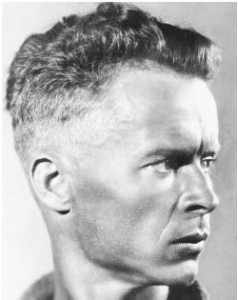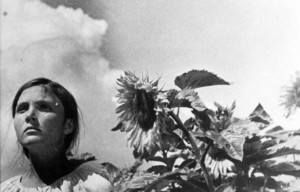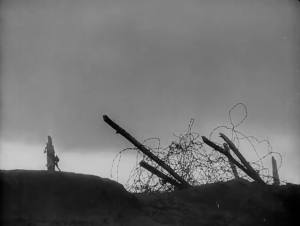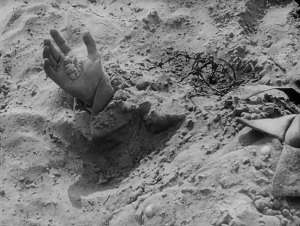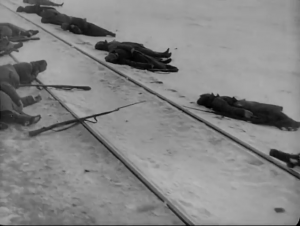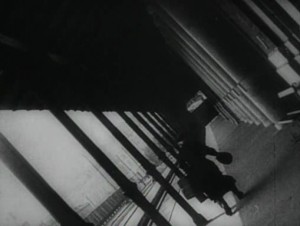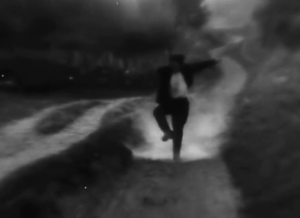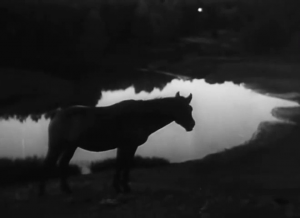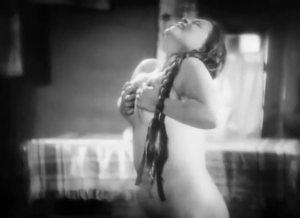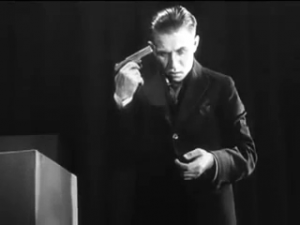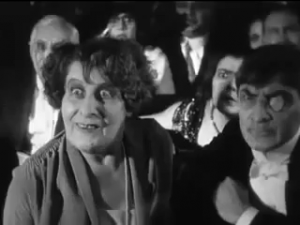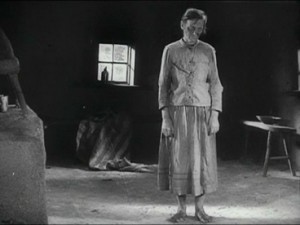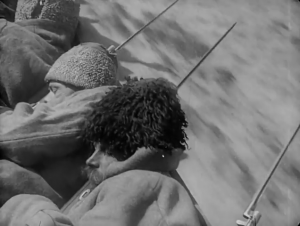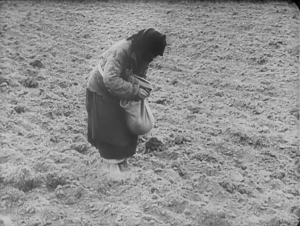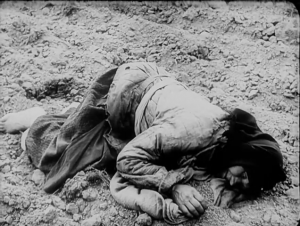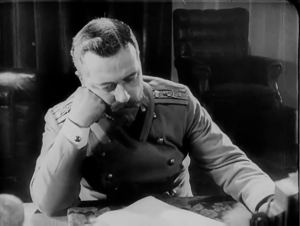Written for MUBI Notebook in April 2020. — J.R.
It’s disconcerting that the collected writings in English of one of the world’s greatest filmmakers currently sells for $852 on Amazon — or a whopping $980, if you opt for the paperback — while the only American book about him downgrades his work’s artistic value in its very title (Vance Kepley’s 1985 In the Service of the State: The Cinema of Alexander Dovzhenko). Look him up on Wikipedia, and you find that his name is shared by a poker player and a psychiatrist — hardly fit company for the epic, poetic Alexander Dovzhenko (1894-1956), a pagan mystic whose masterful films look as wildly experimental, as dreamlike, as hysterically funny, as fiercely tragic, and as beautiful today as they did a century ago.
A Cold War casualty, often defined in the West as a Russian Communist and in Russia as a turncoat, this Ukrainian nationalist lived under KGB surveillance for most of his life — which may help to explain why his devoted second wife Julia Solntseva, who filmed many of his unrealized scripts after his death, had joined the KGB herself, possibly in order to protect her husband. And as one of his better Western explicators, Ray Uzwyshyn, has pointed out, “With regard to the non-Russian republics (i.e. Georgia, Armenia, Moldavia, Azerbaijan, et al.), the larger cinematic histories of these republics, like Ukrainian cinema, largely remains a blank slate for the West…”
To suggest just how blank it can be, consider film critic James Agee, one of Dovzhenko’s most passionate American supporters, writing to his Time editors circa 1947, proposing a cover story on Sergei Eisenstein, that “another Russian [sic] director of very great ability, Alexander Dovzhenko, has not, thus far, gotten into any trouble.” Yet trouble was his middle name from the get-go, even before he ran afoul of Stalinist censors and functionaries blocking his projects, by virtue of his lifelong commitments to Ukrainian culture and independence. It was a commitment that ultimately led to a bureaucratic stifling of his art after the 1930s, and eventually it killed him.
The seventh child of illiterate farmers who had fourteen offspring, only one other of whom was still alive when he turned eleven, Dovzhenko was persuaded by a semiliterate grandfather to attend school, and became a teacher in his late teens. After serving in the Red Army and working as a diplomatic assistant in both Warsaw and Berlin (where he also studied art with George Grosz), he worked as a graphic artist and cartoonist back in the U.S.S.R., and finally turned to filmmaking around the time he was pushing thirty.
“Whenever I think of my childhood and of my home,” he once wrote, “in my mind I see crying and funerals” — and death figures as a near-constant in his work, especially in Zvenigora (1928), Arsenal (1929), and Earth (1930), his last three silent films (and, many would say, his greatest). In the first two, deaths are violent and connected to warfare. Earth, mainly concerned with collectivized farming, begins with the peaceful death of an old man (modelled on Dovzhenko’s grandfather), viewed as an event occurring in harmony with nature.

To understand Dovzheko’s visionary talent, one has to factor in his ecstatic love of nature and all the other arts that fed into his cinema: not just painting but also sculpture, literature (according to Uzwyshyn, “Dovzhenko’s literary output is considered seminal in Ukrainian literary history”), theater (especially in Zvenigora and Aerograd [1935]), music (both classical and folk, and complete with singing horses in Arsenal), and dance — perhaps even landscaping if one considers his lyrical ways of capturing and harnessing (or unleashing) sunflowers, fields, rivers, and forests.
These diverse arts and crafts — also including such varied cinematic tools as slapstick, slow motion, fast montage, equally epic closeups and long shots, audiovisual counterpoint, superimposition, and changes in focus — are employed not as references but as ways of expressing Dovzhenko’s boundless exuberance. This is why his art is justly regarded more as poetry than as prose, and why it comes across in leaps, swerves, and bends. His structures often seem closer to music than to dramatic narrative — or, rather, closer to music as drama and narrative, as in opera and ballet. Arsenal is staccato, Earth legato. And contrary to our clichéd notions of Soviet propaganda in praise of tractors and dams, his peculiar brands of agitprop in the 20s and 30s, when his art could still flourish, are neither ecologically nor politically correct. In Earth, a stalled tractor gets fueled with workers’ urine and a beautiful woman savagely mourns her boyfriend’s death by tearing off all her clothes (two sequences cut by Stalin’s censors but eventually restored). A crusty old slacker in Dovzhenko’s next film, Ivan (his first talkie, 1932), is comically celebrated for proudly refusing to do a lick of work in building a mighty dam.
I would argue that Dovzhenko’s undeserved marginality derives in part from the marginal way we tend to regard country folk, especially when they display the unbridled freedom of avant-garde artists. (Two other examples: William Faulkner in literature, Jia Zhangke in cinema.) Many of us unconsciously adopt the city-bred bias that innovative art belongs to urban audiences and depends on some form of city smartness, reluctant to believe it can also come from hillbillies. That these artists seem to reinvent their own art forms may lead us to think that they somehow arrived at their discoveries by brute instinct rather than by study or intellect, but this means overlooking the fact that Faulkner read James Joyce and Dovzhenko was exposed to modern art in Warsaw, Berlin, and Odessa.
At the same time, his view of urban decadence could be scathing. Near the end of Zvenigora, a reactionary Cossack, to finance a Ukrainian treasure hunt, pretends to shoot himself onstage as part of an avant-garde “happening”, and the predatory city audience that cheers him on is depicted with the sort of cartoonist’s savagery that we associate with a Kubrick. But one reason why he could direct rustic nonprofessionals seamlessly is that one never feels that they’re being regarded snobbishly from a big-city perspective, which would filter our unimpeded view of them. This doesn’t mean that Dovzhenko was any sort of primitive, yet our cultural baggage suggests otherwise.
“Oh, a mother had three sons,” reads the first intertitle of Arsenal, as if beginning a folk ballad about war, just after we see that mother brooding in her shack, and shortly before we see the three sons cramped together in the open car of a moving train. Only a moment later, she no longer has three sons. Then the film cuts between her sowing seeds until she collapses with grief and a thoughtful officer writing a letter, “September 12. I killed a crow. The weather is nice. Nikki.”
The point of such a juxtaposition isn’t simple irony, because the officer isn’t the sort of goon one might expect in an Eisenstein or Pudovkin montage but a caring human being. Dovzhenko trusts us to gauge the humanity of both people and make our own judgments, thereby honoring us along with his characters. The complex simplicity of his genius persuades us to rethink and resee everything, as if for the first time.
8/22/21: Arsenii Kniazkov on Facebook pointing out my embarrassing misinterpretation, as follows: Many thanks for your pieces on Ukrainian cinema (Dovzhenko, Illienko, Muratova). A minor correction, if I may: the thoughtful officer in Arsenal is, in fact, tsar Nikolai II (thus, Nikki), writing not a letter but a diary entry, who, regarding the context, isn’t really presented as a caring human being, but on the contrary, as a person uncapable of empathy to the point of absurd (even in contemporary culture, he is notorious for: 1) being laconic and indifferent in his diary all through the most turbulent and tragic times; 2) routinely shooting crows, stray cats and dogs for pleasure while taking his walks).

